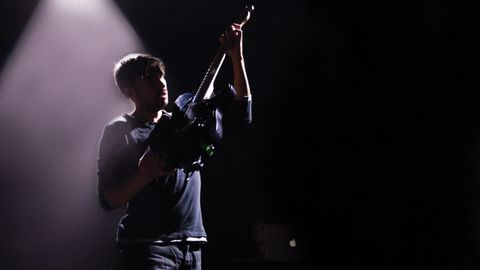The Pineapple Thief are one of prog’s – and rock in general’s – best-kept secrets.
They play to a few hundred tonight but they could, and should, be filling spaces several times this size. What Have We Sown? is a riveting, epic, multipartite start to the set – to any set. Dark Side Of The Paranoid Android, anyone? When frontman Bruce Soord declares, “It’s great to be back,” the feeling is mutual. The Pineapple Thief’s pulsating, atmospheric prog would be well served in front of a big crowd in a giant amphitheatre – their stadium Sturm und Drang threatens to overwhelm this modest venue. Wake Up The Dead sounds like Radiohead playing it relatively hard and straight, with an almost funk-metallic bite and rocktronic pulse.
But The Pineapple Thief aren’t quite as wilful and experimental as Tommy Yorke and Co. Alone At Sea is more INXS than Kid A. It’s even (whisper it) commercial, with hooks and muscular musicianship designed for maximum thrills. Soord coaxes all manner of plangent and punchy sounds out of his guitar while the rest of the band more than keep up with his abrupt twists and turns and changes of tempo and attack.
The Pineapple Thief – TPT to their friends and fans – specialise in piquant energy and mordant melancholy. How about soaring, savage sorrow? That as well. What is Soord’s problem? That’s a good question, and one he attempts to explore, even answer, on_ The One You Left To Die_. It’s love and loss (the latest work explores the death of a friend), and that’s not being flippant. It points to a certain croony appeal that Soord has: amid the hard‑rock thrust there’s melody and an eagerness to soothe as much as disturb. It’s as if he’s singing ballads, only they’re wrapped in proggy complexity and dissonant surges.
Don’t Tell Me has the churchy, sepulchral quality of a hymn, while Coming Home is a slow-building anthem. All The Wars seems to be on the verge of segueing into Oasis’ Don’t Look Back In Anger, but we’ll let that pass because, after all, you can’t argue with a killer chord sequence, even if the keening strings on the recorded version are missing; ditto tonight’s version of Magnolia.
Who mentioned Keane? [Er, you did! – Lives Ed] TPT swap studio polish for a live verve that could easily spill over into Coldplay-style populism, and Seasons Past has a ruined grandeur worthy of latter-day Floyd. Remember Us is a treat for diehards as the band have never played it live before. For Bond they’re joined by a trumpeter for about two seconds, but then the devil’s in the detail. 137, from 2001, reminds us how long this band have been going, and how overdue their breakthrough is.
They play three encores: Part Zero, Snowdrops and Nothing At Best, which is more Prodigy than Procol Harum, sheer ravey delirium. Consider the fire well and truly started.


